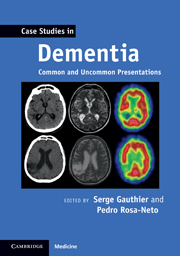Book contents
- Case Studies in Dementia
- Case Studies in Dementia
- Copyright page
- Contents
- Contributors
- Preface
- Acknowledgments
- Introduction to the diagnosis of dementia
- Case 1 Subjective cognitive complaint
- Case 2 Man with subjective complaints but abnormal CSF
- Case 3 When mild cognitive impairment really is Alzheimer's disease
- Case 4 Lost for words
- Case 5 Woman with right-sided numbness
- Case 6 Don't be fooled by a misleadingly high MMSE score
- Case 7 Hemiparesis followed by dementia
- Case 8 Young man with behavioral symptoms
- Case 9 Woman with visual complaints
- Case 10 Difficulty playing tennis
- Case 11 Progressive aphasia complicated by intracerebral bleeding
- Case 12 Progressive difficulty with naming and object identification
- Case 13 A lady with weakness, fasciculations, and failing memory
- Case 14 Progressive difficulty producing speech
- Case 15 Young man with progressive speech impairment and weakness
- Case 16 Personality disintegration – it runs in the family
- Case 17 Woman with complaints about her left arm
- Case 18 The aged brain: when the pieces don't fit
- Case 19 Hypersexuality in a 69-year-old man
- Case 20 Man with fluctuating confusion
- Case 21 Man with post-operative cognitive impairment
- Case 22 Penicillin for dementia in a young man
- Case 23 Thiamine for dementia in a young woman
- Case 24 Dizziness in someone with HIV
- Case 25 Case of young man smoking pot but with a mother who died of dementia
- Case 26 University educated man with childish behavior
- Case 27 Frontotemporal lobar dementia vs. solvent intoxication: A piece that does not fit the puzzle
- Case 28 Man with difficulty keeping pace
- Case 29 Young woman with abnormal movements but no family history
- Case 30 Elderly lady with right-sided visual hallucinations
- Case 31 Woman with gait impairment and difficulty reading
- Case 32 Man with problems with reading and calculating
- Case 33 Man with gait impairment and urine incontinence
- Case 34 Falling before forgetting
- Case 35 Man who stopped drinking
- Case 36 Woman with dementia and hepatic disease
- Case 37 Young woman with recurrent “stroke” attacks
- Case 38 Young man with slow cognitive decline
- Case 39 Young woman with lateralized motor symptoms
- Index
Case 16 - Personality disintegration – it runs in the family
Published online by Cambridge University Press: 16 May 2011
- Case Studies in Dementia
- Case Studies in Dementia
- Copyright page
- Contents
- Contributors
- Preface
- Acknowledgments
- Introduction to the diagnosis of dementia
- Case 1 Subjective cognitive complaint
- Case 2 Man with subjective complaints but abnormal CSF
- Case 3 When mild cognitive impairment really is Alzheimer's disease
- Case 4 Lost for words
- Case 5 Woman with right-sided numbness
- Case 6 Don't be fooled by a misleadingly high MMSE score
- Case 7 Hemiparesis followed by dementia
- Case 8 Young man with behavioral symptoms
- Case 9 Woman with visual complaints
- Case 10 Difficulty playing tennis
- Case 11 Progressive aphasia complicated by intracerebral bleeding
- Case 12 Progressive difficulty with naming and object identification
- Case 13 A lady with weakness, fasciculations, and failing memory
- Case 14 Progressive difficulty producing speech
- Case 15 Young man with progressive speech impairment and weakness
- Case 16 Personality disintegration – it runs in the family
- Case 17 Woman with complaints about her left arm
- Case 18 The aged brain: when the pieces don't fit
- Case 19 Hypersexuality in a 69-year-old man
- Case 20 Man with fluctuating confusion
- Case 21 Man with post-operative cognitive impairment
- Case 22 Penicillin for dementia in a young man
- Case 23 Thiamine for dementia in a young woman
- Case 24 Dizziness in someone with HIV
- Case 25 Case of young man smoking pot but with a mother who died of dementia
- Case 26 University educated man with childish behavior
- Case 27 Frontotemporal lobar dementia vs. solvent intoxication: A piece that does not fit the puzzle
- Case 28 Man with difficulty keeping pace
- Case 29 Young woman with abnormal movements but no family history
- Case 30 Elderly lady with right-sided visual hallucinations
- Case 31 Woman with gait impairment and difficulty reading
- Case 32 Man with problems with reading and calculating
- Case 33 Man with gait impairment and urine incontinence
- Case 34 Falling before forgetting
- Case 35 Man who stopped drinking
- Case 36 Woman with dementia and hepatic disease
- Case 37 Young woman with recurrent “stroke” attacks
- Case 38 Young man with slow cognitive decline
- Case 39 Young woman with lateralized motor symptoms
- Index
Summary
Keywords
- Type
- Chapter
- Information
- Case Studies in DementiaCommon and Uncommon Presentations, pp. 115 - 123Publisher: Cambridge University PressPrint publication year: 2011

